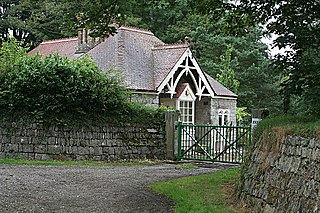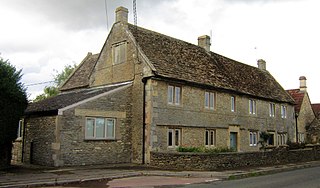
The Château du Clos Lucé, formerly called Manoir du Cloux, is a large château located in the center of Amboise, in the department of Indre-et-Loire, in the Centre-Val de Loire region. It is located in the natural Val de Loire region. Built by Hugues d'Amboise in 1471, the palace has known several famous owners such as the French king Charles VIII and Leonardo da Vinci. Clos Lucé is 500 metres from the royal Château d'Amboise, to which it is connected by an underground passageway.
John Gast (1772–1837) was an English shipwright and labour activist, an early trade unionist.
Feologild was probably a medieval English Archbishop of Canterbury, although slight controversy surrounds his election, with at least a couple of modern historians arguing that instead of being elected, he was merely an unsuccessful candidate for the office. He died soon after his consecration, if he was consecrated.

Earls Colne is a village in Essex, England named after the River Colne, on which it stands, and the Earls of Oxford who held the manor of Earls Colne from before 1086 to 1703.
John Blund was an English scholastic philosopher, known for his work on the nature of the soul, the Tractatus de anima, one of the first works of western philosophy to make use of the recently translated De Anima by Aristotle and especially the Persian philosopher Avicenna's work on the soul, also called De Anima. He taught at Oxford University along with Edmund of Abingdon. David Knowles said that he was "noteworthy for his knowledge of Avicenna and his rejection of the hylomorphism of Avicebron and the plurality of forms.", although the problem of the plurality of forms as understood by later scholastics was not formulated explicitly in Blund's time. Maurice Powicke calls him the "first English Aristotelian."

Bernard Pyne Grenfell, FBA was an English scientist and Egyptologist
John de Carrick, a native of Carrick, Scotland, was a 14th-century Chancellor of Scotland and Bishop-elect of Dunkeld. Although John's exact origins are obscure, he seems to have come from a branch of the old native comital family of Carrick. Later evidence suggests he was a graduate of canon law, but the university is not known.

William Chisholm, bishop of Dunblane and bishop of Vaison, was a son of James Chisholm of Cromlix, and nephew to William Chisholm (I), bishop of Dunblane from 1527 to 1564, to whom he was appointed coadjutor by a brief of Pope Pius IV dated 1 June 1561.
William Hunt was an English clergyman and historian.

The Enys family have lived at Enys, which lies on the northern outskirts of Penryn, Cornwall, time out of mind. The Enys Trust website says: "Robert de Enys lived there during the reign of Edward I." The 1709 edition of Camden's Magna Britannia mentioned that Enys was noted for its fine gardens.
Luce is an American, English, Irish, Scottish, Welsh, French and Italian surname. It is also a French and Italian feminine given name, variant of Lucia and Lucy, or masculine name, variant of Luc. Meaning of given name Luce is "light".
The Dark Lady is a woman described in Shakespeare's sonnets and so called because the poems make it clear that she has black wiry hair and dark, brown, "dun" coloured skin. The description of the Dark Lady distinguishes itself from the Fair Youth sequence by being overtly sexual. Among these, Sonnet 151 has been characterised as "bawdy" and is used to illustrate the difference between the spiritual love for the Fair Youth and the sexual love for the Dark Lady. The distinction is commonly made in the introduction to modern editions of the sonnets. As with the Fair Youth sequence, there have been many attempts to identify her with a real historical individual. A widely held scholarly opinion, however, is that the "dark lady" is nothing more than a construct of Shakespeare's imagination and art, and any attempt to identify her with a real person is "pointless".

Sir Leslie Stephen was an English author, critic, historian, biographer, and mountaineer, and father of Virginia Woolf and Vanessa Bell.

Sir Sidney Lee was an English biographer, writer and critic.

The Dictionary of National Biography (DNB) is a standard work of reference on notable figures from British history, published since 1885. The updated Oxford Dictionary of National Biography (ODNB) was published on 23 September 2004 in 60 volumes and online, with 50,113 biographical articles covering 54,922 lives.












